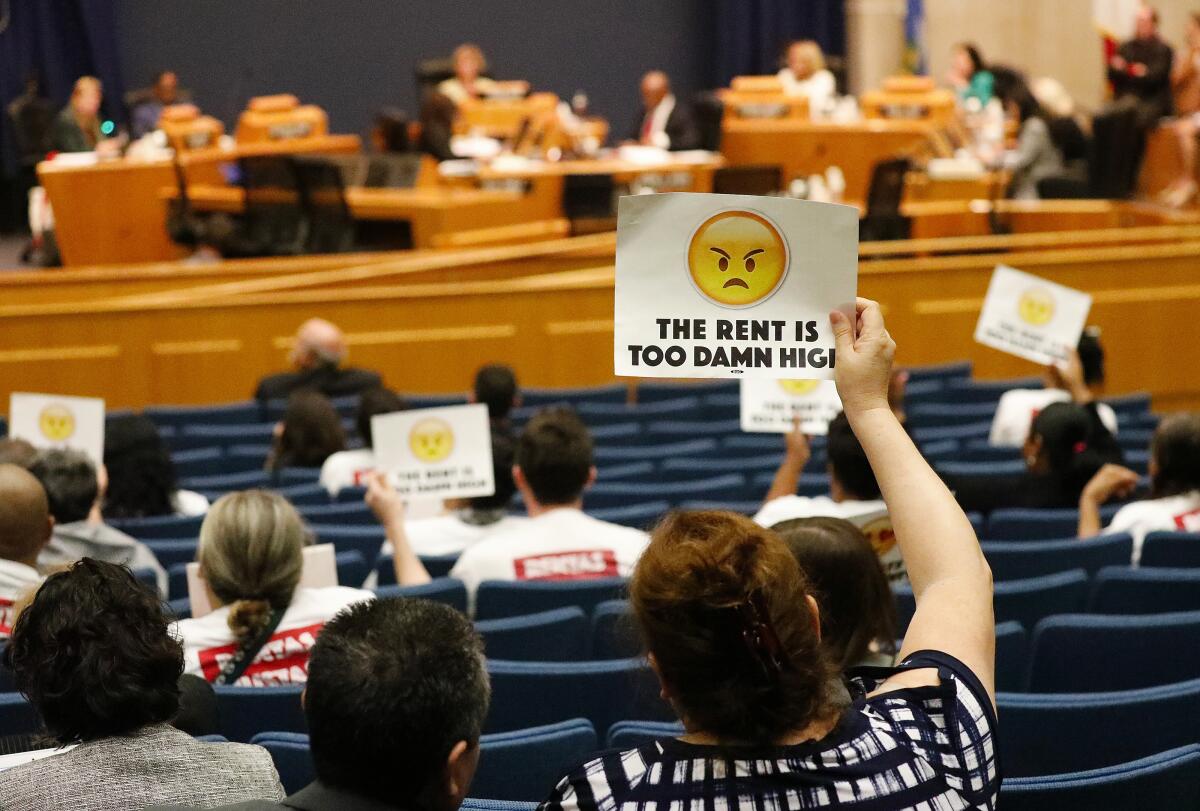Landlords beware: Rent-shamers are calling out overpriced listings online

- Share via
The Facebook post seemed straightforward enough, offering up a newly built ADU rental in Burbank. Two bedrooms, two bathrooms, 1,000 square feet. A private yard. Finishes “you wouldn’t find in any other ADU.”
The price? $4,500 per month.
“Dam, ya’ll need to chill out!! $4,500 for an ADU??”
“Let the rich become richer having the poor paying their mortgage.”
“The greed is VERY REAL here.”
“No wonder there are no pictures. Unless the house is gold plated, it’s not worth it.”
People poured in with comments and emoji reactions ranging from laughing to angry. Before long, the post became a digital dogpile, with users tagging others to join in on the fun.
The doomed listing became another case of “rent shaming” — a modern, perhaps inevitable, phenomenon that’s sprouting up across Facebook housing groups and other platforms as rent continues to soar across Southern California.
Landlords see it as a headache, a needless trend of cyberbullying that exacerbates well-meaning efforts to find tenants. Renters see it as a higher calling — a form of resistance and a way to call out overpriced listings.
“The comment might say ‘BOOOOO’ followed by laughing and poop emojis,” said Sam Eckstein, a renter in East Hollywood who has voiced his derision for high-priced rentals online. “What it actually means is, ‘This rent is ridiculous and you should be ashamed of yourself for trying to take advantage of people.’”
The internet has transformed the real estate industry over the last few decades, removing traditional gatekeepers and allowing sellers and landlords to connect directly with buyers and tenants. House-hunters once had to call the phone numbers on “For Rent” signs or hire real estate agents just to see what was available, but in the age of information, they can compare the prices of everything on the market.
In other words, it’s much easier to gauge whether something is a steal or a rip-off. So when the listing goes live on public forums such as Facebook or Nextdoor, people can make their thoughts very clear, turning ads into virtual battlegrounds between landlords and tenants.
“Your greed is sickening,” a user wrote under a post advertising a one-bedroom rental in Venice for $4,600 a month.
One user told a landlord listing a one-bedroom unit for $2,200 in Woodland Hills to “take your ADU and firmly insert it into your . . . “
Sometimes, the comments are meant to shame a landlord or real estate agent for asking such a high price. Other times, they’re trying to protect unwitting newcomers from overpaying.
“I (recently) signed a lease for a full size 1br with only slightly less nice appliances within reasonable walking distance to the beach on the west side for less than this,” someone posted under a listing of a 500-square-foot one-bedroom rental in Glendale asking $2,500 a month. “Whoever wants this should negotiate pretty hard.”
Eckstein moved to L.A. in 2014, signing a year-long lease for a one-bedroom studio in East Hollywood for $2,000 a month — a price he now realized was far too high for the quality of the apartment.
“I just knew L.A. was expensive and needed a place. I definitely wouldn’t pay that to live there again,” he said.
Over the years, he’s developed a keener eye for good and bad deals. If he sees a landlord on social media asking too much for a rental, he calls it out to make sure others don’t fall into the same situation he did.
In the decade that Eckstein has lived here, rent prices have nearly doubled. In 2014, the average price for an apartment in L.A. County was $1,471, The Times reported. Today, the median rent in the L.A. metro area is $2,796, according to Zillow.
Last year, L.A. held 18 of the 100 priciest ZIP Codes for renters in the country, according to a RentHop study. Usual suspects such as Santa Monica and Malibu ranked toward the top, but even supposedly more affordable neighborhoods, such as Koreatown and Downtown L.A., ranked in the top 100.
Many rental sites, such as Zillow and Redfin, provide rental history data, so prospective renters can see how much previous tenants paid. Some users weaponize that information.
“Lil 20% increase in the rent since Feb. Lovely,” someone commented under a Facebook post offering a two-bedroom bungalow in Cypress Park for $2,395 in August 2023.
For some, the situation has gotten desperate. Tenants enter bidding wars, offering to pay more per month to snag one of the few good deals on the market. Others write letters pitching themselves to landlords — a practice typically reserved for the home-buying market. A man moved into an ambulance. A woman used a loophole in city rules to stay in an Airbnb rent-free for 18 months. And squatting has become such a nuisance that some homeowners contract the services of a man who calls himself the Squatter Hunter.
On social media, the desperation boils over into frustration.
“If I see a post asking $5,000 for a one-bedroom rental, I’m going to say something. And it’s not going to be very nice,” said Katie, who declined to provide her last name because she doesn’t want her social media comments to be publicized.
Katie said the rent-shaming practice is a form of therapy: the masses coming together to tell off people trying to profit on housing.
“At the end of the day, they win, and we lose. We pay for their mortgages, and they get richer while we scrape by,” she said. “The least we can do is make them feel bad about it.”
One landlord, who asked to remain anonymous because he doesn’t want to attract negative comments on his listings, said he’s experienced rent-shaming but said the criticism is misguided.
“A price might be high for someone but perfectly reasonable for someone else,” the landlord said. “The angry comments just make it harder for the people who actually want the property.”
Last year, he posted in a Facebook group offering a two-bedroom apartment in Glendale for north of $4,000. He received a handful of comments claiming it was overpriced, but found a tenant within a week.
“People value different things,” he said. “Every rental isn’t one size fits all.”
The trend is bringing drama to a once-perfunctory process. If the price is a few hundred too low, renters race to tell the landlord that they’re interested. If it’s a few hundred too high, those same users make a mockery of the listing.
Some Facebook housing posts end with a new tenant. Others end with an updated listing offering a reduced price. These days, many end the same: with housing group scarlet letter showcasing that the price was, indeed, too high: “[The user] has turned off commenting on this post.”
More to Read
Sign up for This Evening's Big Stories
Catch up on the day with the 7 biggest L.A. Times stories in your inbox every weekday evening.
You may occasionally receive promotional content from the Los Angeles Times.











